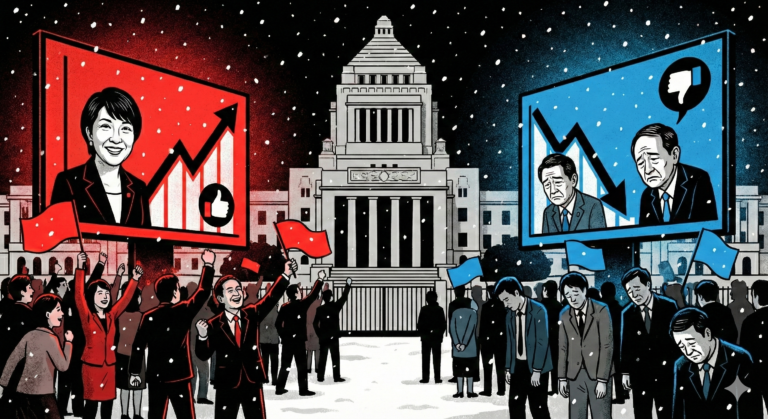Market Reaction: Takaichi’s Landslide Sparks Volatility
Following Sanae Takaichi’s victory in the Liberal Democratic Party’s leadership election, Tokyo’s financial markets reacted with immediate and sharp volatility, signaling a mix of high hopes for growth and deep anxiety over fiscal discipline.
Key Market Data (As of Oct 7, 2025)
- Stock Market (Nikkei 225): Surged +4.75% to close at ¥47,944.76.
- Currency (USD/JPY): The Yen weakened by 1.8%, hitting the ¥150.13 level.
- Bond Market (JGBs): Long-term yields spiked, with the 40-year JGB yield reaching 3.505%.
Analysis: Investors are clearly pricing in “Sananomics”—a policy mix of aggressive fiscal spending and continued monetary easing. While the stock market cheered the prospect of stimulus, the bond and currency markets flashed warning signs about Japan’s fiscal health.
Deep Dive: Is Japan Facing a “Liz Truss Moment”?
Sanae Takaichi’s pledge for “bold fiscal expansion” has drawn immediate comparisons from international analysts to the tumultuous 45 days of former UK Prime Minister Liz Truss in 2022. The “Truss Shock” occurred when the UK government announced large-scale unfunded tax cuts during a period of high inflation, causing the pound and bond markets to crash.
Why the Comparison Exists
Like Truss, Takaichi advocates for spending to spur growth despite a massive national debt. The fear is that if markets perceive her spending plans as reckless, Japan could suffer a similar loss of credibility, leading to a vicious cycle of a falling yen and rising borrowing costs.
Why Japan is Different (For Now)
However, Takaichi emphasizes “Responsible Active Fiscal Policy.” There are critical structural differences between Japan in 2025 and the UK in 2022:
- Inflation Context: The UK was facing double-digit inflation due to an overheated economy. Japan is only just emerging from prolonged deflation, meaning there is still some slack in the economy.
- Debt Structure: The vast majority of Japanese Government Bonds (JGBs) are held domestically, largely by the Bank of Japan and domestic institutions. This makes Japan less vulnerable to sudden capital flight by foreign investors compared to the UK.
The Three Major Risks Facing “Sananomics”
Despite these differences, the path ahead is fraught with risks. The Takaichi administration must navigate a “Triple Threat” that did not exist during the Abenomics era.
1. The End of Cheap Money
With the Bank of Japan ending its Negative Interest Rate Policy and Yield Curve Control (YCC) in 2024, interest rates are now determined by market forces. The 10-year yield has already risen to the 1.3–1.4% range. Japan no longer has the “safety valve” of artificially low rates to absorb unlimited government debt.
2. Exploding Fixed Costs
The budget is increasingly rigid. Social security costs have topped ¥140 trillion due to the aging population. Simultaneously, the government is committed to doubling defense spending to 2% of GDP by 2027. Funding these permanent cost increases with temporary bonds is a strategy that markets will scrutinize closely.
3. Global Inflation & The “Trump Factor”
With Donald Trump’s return to the presidency in 2025, renewed tariffs and protectionist policies are reigniting global inflation. Japan, heavily reliant on imports for energy and food, faces “imported inflation.” Fiscal stimulus in this environment could exacerbate price hikes, hurting households rather than helping them.
Conclusion: The Delicate Balance of Trust
The surge in stock prices suggests that investors welcome Takaichi’s pro-growth stance. However, the drop in the yen and the spike in bond yields serve as a stern warning: The market is watching Japan’s fiscal discipline more closely than ever.
The “Truss Shock” taught the world that financial credibility can evaporate in days. For the new Takaichi administration, the challenge will not be generating ideas for spending, but convincing the global market that Japan has a credible plan to pay for them. The era where politics could ignore market forces is over; now, the bond market is the ultimate referee.
▼ References
- Reuters – Market analysts reaction to Takaichi becoming next Japan PM (October 6, 2025)
- Reuters – BOJ keeps cautiously upbeat economic view, warns of inflation risks (October 6, 2025)
- Bank of Japan – Change in the Guideline for Money Market Operations (January 24, 2025)
- Bank of Japan – Change in the Guideline for Money Market Operations (July 31, 2024)


